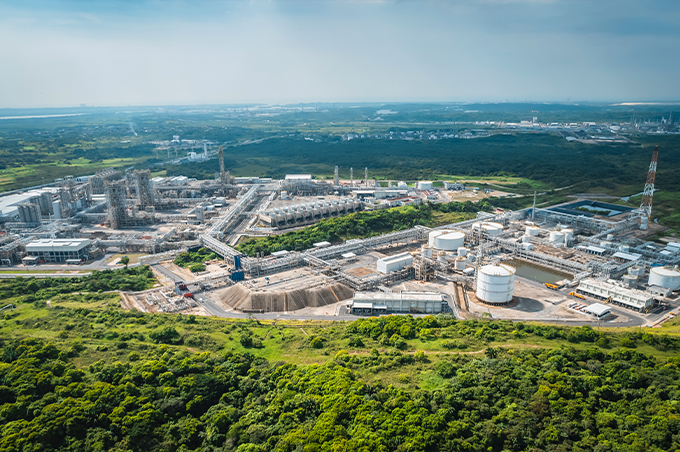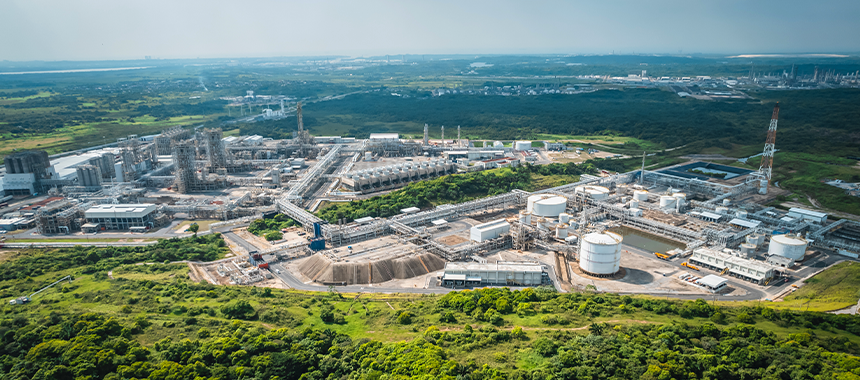Petrochemicals in Mexico: Is there light at the end of the feedstock shortage tunnel?


Image courtesy of Braskem Idesa
Mexico’s domestic petrochemical industry still finds itself in challenging times. Capacity utilization rates continue their downward trajectory, electricity prices are relatively uncompetitive, and given the difficulties faced by PEMEX, which has not been able to produce the necessary feedstocks for a competitive petrochemical industry in the country to flourish, Mexico remains a net importer of petrochemical products. Regulatory controls on shale gas and private energy development in Mexico, compounded by stringent import controls introduced in 2024 to protect national producers of lubricants and other fuel products, further challenged the industry.
ANIQ’s figures for the period January-September 2024 show that the chemical industry’s trade balance presented a deficit of over US$22 billion, a figure 13.2% lower than in 2023; chemical imports were just over US$30 billion, while exports increased by 0.1% annually to US$7.5 billion. Furthermore, while Mexico registered chemical trade deficits with North America, Europe and Asia, it has maintained a trade surplus in chemical goods with Central and South America. Uncompetitive industrial electricity prices in Mexico are an important factor limiting the establishment and expansion of more petrochemical products. Comparing average monthly prices for medium voltage users in August 2024 in Mexico with May 2024 in Texas and Louisiana, the petrochemical heartlands of the US, ANIQ found incredible discrepancies, with US$13.71 cents per kilowatt hour in Mexico and US$6.28 in the US. In addition, power outages in northern Mexico during the summer of 2024 compounded the problem and underlines the unreliability of Mexico’s power grid in comparison to its northern neighbor.
PEMEX’s troubles are well known but are worth re-exploring. The state-owned oil giant’s over US$100 billion debt pile has forced the government into a situation where it has to transfer funds to the company to service its debt continually; Reuters reported that in 2025, the central government would transfer US$6.69 billion to PEMEX, to service due debt. The Sheinbaum presidency, following in the footsteps of her predecessor, has been adamant that the role of PEMEX in the national oil sector is secure, just as it has been firm about its commitment to the CFE (Federal Commission on Electricity) and the monopoly that company maintains over the national power sector. Throughout the year, there were bouts of positive news regarding reported feedstock production figures. PEMEX announced that in the second quarter of 2024, petrochemicals production increased by 15.7% compared to the same period in 2023.
In addition to these national challenges, executives pointed out that larger global trends are putting pressure on the sector.
Despite these challenges, the bright spot for the petrochemical sector remains the fact that with the new Sheinbaum administration, the government’s proximity to private industry and dialogue has improved, and leadership changes at the top of these troubled state enterprises have elicited some hope among chemical industry executives that ideology is on the way out, and practical, empirically based management decisions are on the way in. Examples include the new head of the CFE, Emilia Calleja, a trained engineer with a long career inside the CFE, governor of Veracruz, a key petrochemical region, Rocio Nahle, who is a trained petrochemical engineer, and Victor Rodriguez, CEO of PEMEX, previously an energy economics scholar at UNAM.
This year is key for Mexico’s petrochemical industry, as Braskem Idesa’s ethane import terminal will come online, the result of a US$450 million investment and partnership with Advario, solidifying Braskem Idesa’s leadership in the polyethylene market. Isabel Figueiredo, the company’s CEO, discussed how the terminal would allow it to strengthen its role in plastic resins nationally and regionally.
The performance of Mexico’s plastic market has been a source of relief. Sergio Paredes Castañeda, CEO of Resirene, Mexico’s leading polystyrene producer said: “By the second half of 2024, we began seeing signs of recovery in the demand for polystyrene in certain market segments.”
Castañeda’s optimism for polystyrene demand is underpinned by a belief that the industry, which has come under scrutiny in the past for its waste profile, is now being re-vindicated. Resirene doubled its sales of recycled material products in 2024 and has ambitious targets to triple sales of these products in 2025. Castañeda added: “We see promising trends in countries like Sweden, where there is growing recognition that alternative materials like cardboard and paper may be less environmentally effective.”
In the lubricants market, strong industrial demand has had to contend with regulatory import controls introduced by the last administration, which limited import quantities and drove up legal and compliance costs for companies that are heavily dependent on imported lubricants to meet demand. José Guzmán, managing director of Castrol in Mexico, stated that despite advances in EV adoption, in Mexico, the lubricants market remains traditional, and EV adoption is a long way off. Guzmán also commented on the import controls, saying: “The Mexican government has recently implemented regulations intended to increase oversight, particularly within the fuel sector, and it is currently applying similar controls to lubricants.”
Though these restrictions caused an upset among importers, some local producers benefit, including Schutz Industrial Lubricants and Specialties, a producer of lubricants and chemical specialties for the automotive, personal care, energy, and other sectors. Bernardo Gómez-Rábago, the company’s CEO, said: “The new import controls for lubricants have had an impact, but they also emphasize the importance of having a local supplier. A local supplier ensures consistent quality and timely deliveries, which are crucial for businesses.”

Image courtesy of Braskem Idesa
Mexico’s domestic petrochemical industry still finds itself in challenging times. Capacity utilization rates continue their downward trajectory, electricity prices are relatively uncompetitive, and given the difficulties faced by PEMEX, which has not been able to produce the necessary feedstocks for a competitive petrochemical industry in the country to flourish, Mexico remains a net importer of petrochemical products. Regulatory controls on shale gas and private energy development in Mexico, compounded by stringent import controls introduced in 2024 to protect national producers of lubricants and other fuel products, further challenged the industry.
ANIQ’s figures for the period January-September 2024 show that the chemical industry’s trade balance presented a deficit of over US$22 billion, a figure 13.2% lower than in 2023; chemical imports were just over US$30 billion, while exports increased by 0.1% annually to US$7.5 billion. Furthermore, while Mexico registered chemical trade deficits with North America, Europe and Asia, it has maintained a trade surplus in chemical goods with Central and South America. Uncompetitive industrial electricity prices in Mexico are an important factor limiting the establishment and expansion of more petrochemical products. Comparing average monthly prices for medium voltage users in August 2024 in Mexico with May 2024 in Texas and Louisiana, the petrochemical heartlands of the US, ANIQ found incredible discrepancies, with US$13.71 cents per kilowatt hour in Mexico and US$6.28 in the US. In addition, power outages in northern Mexico during the summer of 2024 compounded the problem and underlines the unreliability of Mexico’s power grid in comparison to its northern neighbor.
PEMEX’s troubles are well known but are worth re-exploring. The state-owned oil giant’s over US$100 billion debt pile has forced the government into a situation where it has to transfer funds to the company to service its debt continually; Reuters reported that in 2025, the central government would transfer US$6.69 billion to PEMEX, to service due debt. The Sheinbaum presidency, following in the footsteps of her predecessor, has been adamant that the role of PEMEX in the national oil sector is secure, just as it has been firm about its commitment to the CFE (Federal Commission on Electricity) and the monopoly that company maintains over the national power sector. Throughout the year, there were bouts of positive news regarding reported feedstock production figures. PEMEX announced that in the second quarter of 2024, petrochemicals production increased by 15.7% compared to the same period in 2023.
In addition to these national challenges, executives pointed out that larger global trends are putting pressure on the sector.
Despite these challenges, the bright spot for the petrochemical sector remains the fact that with the new Sheinbaum administration, the government’s proximity to private industry and dialogue has improved, and leadership changes at the top of these troubled state enterprises have elicited some hope among chemical industry executives that ideology is on the way out, and practical, empirically based management decisions are on the way in. Examples include the new head of the CFE, Emilia Calleja, a trained engineer with a long career inside the CFE, governor of Veracruz, a key petrochemical region, Rocio Nahle, who is a trained petrochemical engineer, and Victor Rodriguez, CEO of PEMEX, previously an energy economics scholar at UNAM.
This year is key for Mexico’s petrochemical industry, as Braskem Idesa’s ethane import terminal will come online, the result of a US$450 million investment and partnership with Advario, solidifying Braskem Idesa’s leadership in the polyethylene market. Isabel Figueiredo, the company’s CEO, discussed how the terminal would allow it to strengthen its role in plastic resins nationally and regionally.
The performance of Mexico’s plastic market has been a source of relief. Sergio Paredes Castañeda, CEO of Resirene, Mexico’s leading polystyrene producer said: “By the second half of 2024, we began seeing signs of recovery in the demand for polystyrene in certain market segments.”
Castañeda’s optimism for polystyrene demand is underpinned by a belief that the industry, which has come under scrutiny in the past for its waste profile, is now being re-vindicated. Resirene doubled its sales of recycled material products in 2024 and has ambitious targets to triple sales of these products in 2025. Castañeda added: “We see promising trends in countries like Sweden, where there is growing recognition that alternative materials like cardboard and paper may be less environmentally effective.”
In the lubricants market, strong industrial demand has had to contend with regulatory import controls introduced by the last administration, which limited import quantities and drove up legal and compliance costs for companies that are heavily dependent on imported lubricants to meet demand. José Guzmán, managing director of Castrol in Mexico, stated that despite advances in EV adoption, in Mexico, the lubricants market remains traditional, and EV adoption is a long way off. Guzmán also commented on the import controls, saying: “The Mexican government has recently implemented regulations intended to increase oversight, particularly within the fuel sector, and it is currently applying similar controls to lubricants.”
Though these restrictions caused an upset among importers, some local producers benefit, including Schutz Industrial Lubricants and Specialties, a producer of lubricants and chemical specialties for the automotive, personal care, energy, and other sectors. Bernardo Gómez-Rábago, the company’s CEO, said: “The new import controls for lubricants have had an impact, but they also emphasize the importance of having a local supplier. A local supplier ensures consistent quality and timely deliveries, which are crucial for businesses.”